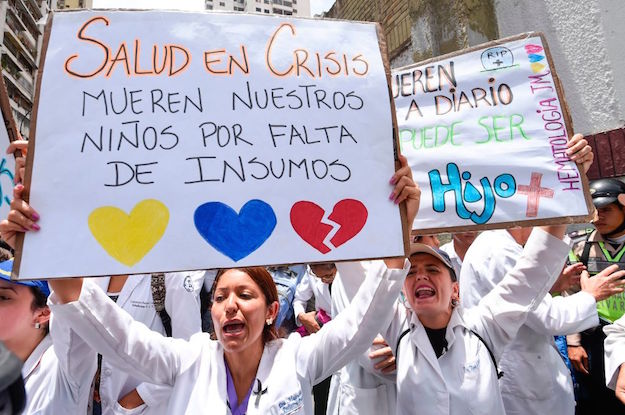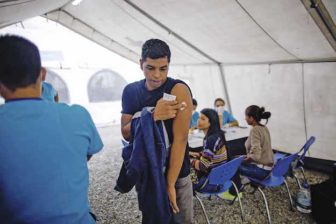Missing treatment can make things very bad, very quickly for those with HIV. Even one missed dose carries the risk of the virus becoming more resistant – and more dangerous. In Venezuela, shortages of vital medicines have interrupted the treatment of approximately 80 percent of people with HIV, and the consequences have been deadly. In 2012 there were 2,100 HIV-related deaths in all of Venezuela; so far in 2017, there have been over 1,600 in Carabobo state alone, home to just 7 percent of the total population.
This lack of medicine is far from the only threat facing Venezuelans living with HIV. Shortages of food and basic supplies have added a layer of difficulty to dealing with the virus. An extreme example is that of hundreds of mothers with HIV who, lacking access to both medication and to baby formula, are forced to choose between breastfeeding their babies – which carries the risk of exposing them to the virus – or letting them go hungry.
As the head of AID FOR AIDS, an international nonprofit that provides free antiretroviral treatment to people with HIV and to at-risk communities in the developing world, I’ve been committed to helping those with HIV in Venezuela for over 20 years. As we’ve expanded the scope of our work to deal with the tragedy facing the country’s mothers with HIV, I’ve seen firsthand how difficult bringing outside aid to Venezuela can be. It has made me all the more firm in my commitment to keep trying.
In May 2016, I received a call from the president of the Red Venezolana de Gente Positiva (The Venezuelan Network of People with HIV) looking for support. They estimated 61,000 people would have their treatment interrupted within two months for lack of access to medication, and I offered to mobilize our international network to provide as many antiretroviral treatments as possible. Around that time, I learned of the roughly 1,000 mothers with HIV had had neither medication nor formula for their babies.
A few weeks later, during a speech to the Venezuelan American Association in New York, I was given an opportunity to bring the problems facing Venezuela’s population to the attention of people who might be able to help. I wanted to provide antiretroviral treament and baby formula to young mothers, and one audience member in particular showed great enthusiasm for the idea. This person spoke of using his professional contacts to raise the money necessary for a large effort. We agreed to try to help not just the children of HIV-positive women, but also those of any women who couldn’t breastfeed due to other medical conditions that made it unsafe. We settled on the goal of providing formula for 5,000 babies for six months at a cost of $1 million.
AID FOR AIDS, then set about making this idea a reality, but the challenges of even a simple effort in Venezuela were enormous. Due to concerns over government retaliation and access to raw materials, three separate corporations told us we would be unable to sell or donate their formula in Venezuela. After exploring our options through a contact in the dairy industry, we decided that the only way to do this would be to commission and produce baby formula under our own label. We found a manufacturer, and settled on a deal. Once the agreement was ready, I sent the details to the audience member who had expressed so much enthusiasm for the project. Sadly, he never replied.
My search for support has continued, but it has been an uphill battle. There are major logistical and financial challenges to bringing any humanitarian aid to Venezuela, not least of which is the government’s refusal to accept it. The administration of President Nicolás Maduro does what it can to obscure the severity of its humanitarian crisis. Doubt permeates the Venezuelan diaspora as well as the international community when it comes to our path to helping Venezuela.
And things are getting worse. The situation that spurred my frustrated attempts to help in 2016 barely compares to what Venezuela faces today. Infant mortality has increased 35 percent. There are thousands of new mothers who have HIV, or Hepatitis C, or other health conditions that make breastfeeding unsafe. For the past four months, 80 percent of people on HIV treatment have had no access to medication at all. This represents a very serious public health threat, as HIV treatment interruption not only affects the person with HIV but also increases the transmission rates of the virus.
The health crisis has deepened so greatly that it has placed one of Venezuela’s indigenous communities, the Warao, on a path towards extinction. In 2013, 10 percent of this community of only 25,000 people was diagnosed with HIV. This number is as high as some African countries at the peak of the pandemic in the 1980s and 90s. None of the HIV-positive Warao have been treated, and today we don’t know what the real HIV rate is. This threat could decimate the tribe.
It is incumbent upon us to continue our efforts. At AID FOR AIDS, we have found a way to respond to the crisis facing the Warao thanks to the support of some UN agencies. We have so far sent 8,000 HIV rapid tests, so we can determine the size of the problem within the Warao community and then acquire the medicines needed. At the International AIDS Conference in Paris on July 25 I was able to speak about the humanitarian crisis in Venezuela, and was amazed by the overwhelming support of the international community. People understand the size of the crisis, and are willing to offer their support through international cooperation agencies in ways that take the Venezuelan government’s obstacles into account and therefore won’t compromise the work.
Despite the darkness of this humanitarian crisis, we must all stay organized to minimize the impact. It is our responsibility; Venezuela needs us now and it will need us still once the conflict has passed.
—
Aguais is the founder of AID FOR AIDS International








